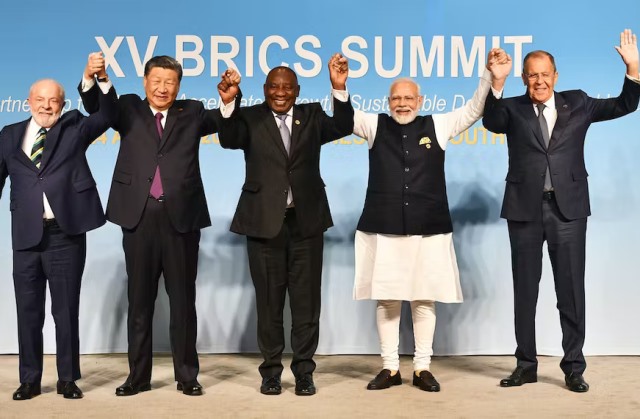
BRICS Expansion, Geopolitics And India
BRICS concluded its 15th Summit in Johannesburg, South Africa last week. India is a key partner in the original BRICS and has been participant in the key highlight of the summit, the announcement of expansion of the group from January 1, 2024. The newly inducted members are as disparate as the original group. They comprise the United Arab Emirates, Kingdom of Saudi Arabia, and the Republic of Iran from West Asia, two Nile riparian countries of Egypt and Ethiopia from Africa and Argentina from South America.
If the inclusion of major oil producers from West Asia provides political heft and clout to the group, Egypt and Ethiopia represent African aspirations of representation in the global fora. Argentina, being an economic and financial struggler may be looking for revival through loans with less stringent conditions from BRICS’ New Development Bank.
The location of the BRICS countries and the new members is interesting, in terms of geopolitical reach. Egypt and Saudi Arabia also have been major beneficiaries of their strong linkages with the United States of America during Cold War and after. They facilitated US in West Asia and the Arab World. Now, it seems the tables have turned, perhaps, with the onset of a new Cold War. The second pole, however, this time comprises the formidable Russia-China alliance. Does BRICS expansion signal the return of the proverbial Chessboard vis-à-vis NATO? Or the BRICS is just an economic power bloc enhancing its energy prospects and geographical extent? What are the implications for India of the expanded membership? The article seeks to answer these questions.
BRICS’s fundamental aims since its conception have concentrated upon creating a new financial architecture in the international system. Gradually, however, it is acquiring a political character and has been concerned specifically with security issues in the international system. This is reflected in consecutive Summit Statements of recent years and political and security cooperation forms the most important pillar of collaboration in BRICS.
Owing to Russia-Ukraine war, this year’s summit acquires tremendous significance as none of the BRICS members have been openly critical of Russian actions. Russia intends to overcome the sanctions imposed by the United States and the West and thereby supports the expansion of BRICS. China benefits in its effort to shape a new international order wherein Beijing holds the leadership. With its economic strength and increasing military numbers, it is well placed to work on alternative financial and economic mechanisms which may be acceptable to many countries, visible in the interest in the membership of the BRICS.
ALSO READ: Does India Have A Meaningful Future in BRICS?
Regionally, inclusion of Saudi Arabia, UAE and Iran shows that the West Asian ‘Arc of Instability’ now has a range of actors and a different set of stakeholders. Saudi Arabia being the largest exporter of oil and China, the largest importer, the partnership will grow and will have implications for the international energy scenario. Traditionally, the US has been a trusted partner of the Saudis and such change may be considered a blow to US interests in West Asia.
Furthermore, Iran with it’s expanding nuclear programme and resulting sanctions have been at loggerheads with the US and the West. An important regional arena through which the US established its military and geopolitical credentials now seems to be sliding out of its grip. US withdrawal from Afghanistan two years ago perhaps was the commencement of this process. The process may be hastened with BRICS membership for Saudi Arabia and Iran, whereas the major beneficiary is China with its ambitions of global geopolitical dominance. Moreover, China, is the leading trading partner of most countries in the region and beyond in Central Asia and South Asia.
For India, inclusion of six new members into the BRICS has several implications. Initially, during the Johannesburg summit, Brazil and India were skeptical of expansion and were keen on the modalities and criteria for inclusion of new members. The inclusion, however, reflects rising Chinese influence in the international system as BRICS and the Shanghai Cooperation Organization are primarily led by Beijing. The membership of both comprises of major regional actors in their respective regions and they cover Eurasian landmass in the case of SCO and BRICS has membership from all the continents except for North America.
China and India have major differences on a range of issues, the foremost being the contentious Line of Actual Control where they blame each other for massive deployment of troops in the Himalayas since 2020. Therefore, rising Chinese influence in any sphere is inherently not a favourable situation for India.
India, on the other hand, in the recent past has drifted towards the US, the other pole of the emerging Cold War. For New Delhi to feature in two major organizations led by China and at this critical juncture in the international scenario may be a balancing act, but it will have long term ramifications.
It may be argued that India with the current dispensation asserts its strategic and national interests but agreeing to a Chinese agenda may not create that impression. Also, the illusion that BRICS and SCO are representatives of the Global South and thereby India agrees to be a part of them, now comes under scrutiny. With the membership of Iran and Saudi Arabia, BRICS is now a geopolitical group aimed at the US and the West. India must find it hard to negotiate with the two antithetical arrays in global geopolitics.
Read More: http://13.232.95.176/



